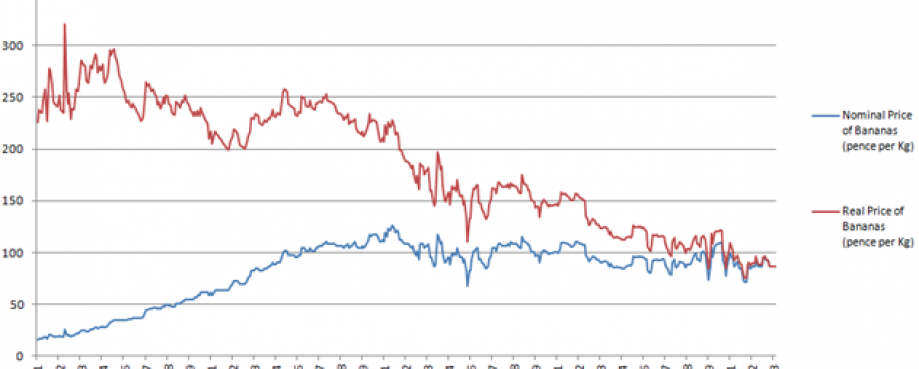
British retail buyers are acutely aware that the price wars (and 'promises') on their biggest food line cannot continue much longer. They are aware that selling loose bananas at 68p per kilo is destroying banana value for producers and workers worldwide. They are also aware that producers' costs continue to rise faster than the gradual reduction in banana import tariffs into the EU. They are aware that decent work in these chains is a goal that is put on hold as long as bananas are bought and sold too cheaply.
But so far none of them has managed to convince the commercial leadership of their companies to break out of the poverty-perpetuating logic of 'everyday low prices' on our favourite slow energy-releasing fast food. Who will break ranks and join the Co-op at more sustainable pricing levels? And, as 2014 contracts are being discussed, will we have to wait another year before the destructive downward pressure on producers and workers is eased?
Supplying the UK in current conditions, say producers large and small, is a mug's game!
In case anybody was in any doubt that the pricing practices of UK retail are not confined to Britannia's shores and are affecting other markets, let's take a look across the North Sea. Jumbo is the Netherlands' second biggest chain, a Dutch Asda equivalent, let's say. In October 2013, Jumbo proudly announced it was moving away from the traditional continental approach to banana promotion – 1 to 3 week cut prices, then back to normal – and is now selling its multinational branded fruit at 99 Euro cents (85p) per kilo. Until further notice. Meanwhile suggesting to consumers (and competitors) that sustainability is not being sacrificed. Just an 'investment in promotion', as the jargon goes. Jumbo is the first in continental Europe to take this 'so British' approach.
Even the German 'hard discounters' continue to believe in making a bit of a margin on loose banana sales. Average banana retail prices in Germany were around 97p per kilo last week. In France, they remain nearer £1.25 on average and are a cool £1.70 per kilo in France's largest global retailer, Carrefour – all for the same bananas sold in UK supermarkets.
Should civil society organisations be contributing to a debate characterised by a 'radio silence' approach from British retailers? From an ethical trading perspective, and as a member of ETI, Banana Link defends our right to have something to say. We have said – and will continue to say until a retailer breaks ranks on pricing – that selling below the cost of purchase should be illegal, Fairtrade certified or not.
We owe it to the millions of people in 15 countries of Latin America, the Caribbean and Africa to demonstrate clearly that plantation and packhouse workers and small-scale family farmers cannot survive on poverty prices that result from an 'everyday low price', value-stripped philosophy. Not even the big brands that own big plantations with all the economies of scale can cover costs in the UK market.
Three of the big four retailers now buy direct through their in-house produce sourcing companies. Direct sourcing currently accounts for 40% of the UK banana market. Close to 30% is Fairtrade labelled. But there is no overlap between these two shares.
How much longer do the several hundred thousand people whose livelihoods depend on selling bananas to Britain have to wait before good business practice and ethical coherence break out? And do UK consumers, hard-pressed though they are, all agree that cheaper bananas at any cost is a good thing?
